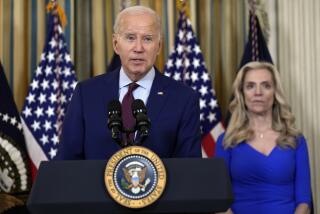White House to Enact New Internal Security Measures
- Share via
WASHINGTON — The White House has approved new measures designed to tighten the federal government’s internal security by such means as prosecuting “leaks” of secret information and curbing access to classified documents, a top security official said Tuesday.
The 13 measures--drawn up last November after the breakup of the Walker Navy spy ring--won National Security Council approval last month and could be in place by the end of the year, said Steven Garfinkel, director of the federal Information Security Oversight Office.
Implementing the proposals will require revising at least one presidential order governing classified information as well as changes in Justice Department guidelines for investigating “unauthorized disclosures,” Garfinkel said.
Second Part of Security Effort
The new internal security safeguards are the second half of a White House effort to hinder foreign espionage agents’ activities in the United States. The first half of that effort--a lengthy analysis of U.S. security and counterintelligence weaknesses--was sent to Defense Secretary Caspar W. Weinberger last fall and has been partly implemented.
The latest proposals were drawn up by an 11-member panel that included representatives from the CIA, the FBI and the Justice Department. They are aimed at reducing “over-classification”--the government penchant for stamping even innocuous documents secret--and at cutting the number of federal workers with access to classified information.
A report sent to congressional committees last fall by Garfinkel stated that many agencies distribute secret materials “on an automatic and recurring basis” and that special exceptions to normal security rules have proliferated beyond reason.
New Guidelines
The most contentious of the 13 proposals requires the Justice Department to draw up new guidelines for investigating leaks of classified material. Both the Reagan Administration and past presidents have proposed many measures to plug leaks to reporters and others, but most have been abandoned as ineffective. Most recently, the White House scrapped proposals to give lie-detector tests to suspected “leakers” after the suggestion stirred a small storm of protest.
Among the other measures, the security controls will extend restrictions on photocopying to all classified materials instead of only top secret documents, the highest of the classification orders. Agencies also will be required to review distribution lists for secret material “at least annually,” and security duties will be included in the job performance ratings of federal managers.
Called ‘Fiddling at the Edges’
Congressional officials have been skeptical of the proposals, many of which center on new advisories instead of rules or laws that carry penalties for a violation of security rules.
The Senate Intelligence Committee urged in December that the proposals be immediately carried out, but also called for more sweeping changes in federal security programs to make them less complex and more enforceable.
One congressional expert said Tuesday that the White House proposals are “just fiddling at the edges” of the problem, and added that Reagan had actually contributed to the problem with a 1982 order providing that more data be classified.
Garfinkel said, however, that increases in defense and intelligence programs created more classified documents.
More to Read
Sign up for Essential California
The most important California stories and recommendations in your inbox every morning.
You may occasionally receive promotional content from the Los Angeles Times.













